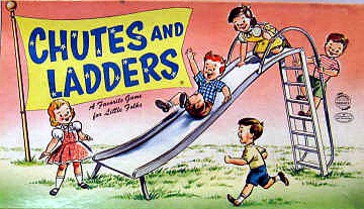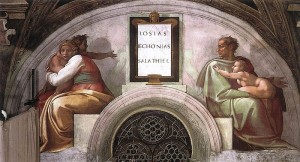
I don’t remember my first ride down the slide at the park. I imagine it was something like what I have observed since then, somebody on one end, maybe dad, pushing me up the steps, and mom down at the bottom, urging me to let go of the bars and sliding that first slide.
I do remember my first bike ride, though. I had waited a full year later than my oldest brother. I just didn’t want to risk falling off the thing. The training wheels were really cutting into my style though, so one afternoon, with my dad ready to run along side me, I got on it, (a hand-me-down Schwinn with a banana seat, and proceeded to go to the end of the block without falling over. I was ready.
Life is an adventure. It involves risk. Acceptable risk, but there is risk.
But I was risk averse. So much so, my dad tried to inspire me. One day, in my late teen years, he brought home a quotation from Theodore Roosevelt, in 1910:
“It is not the critic who counts; not the man who points out how the strong man stumbles, or where the doer of deeds could have done them better. The credit belongs to the man who is actually in the arena, whose face is marred by dust and sweat and blood; who strives valiantly; who errs, who comes short again and again, because there is no effort without error and shortcoming; but who does actually strive to do the deeds; who knows great enthusiasms, the great devotions; who spends himself in a worthy cause; who at the best knows in the end the triumph of high achievement, and who at the worst, if he fails, at least fails while daring greatly, so that his place shall never be with those cold and timid souls who neither know victory nor defeat.”
The thought haunted me. And I was that timid young man. I could see others succeeding, but me, seriously!?
The real problem was that I had no confidence; I did not know what I was capable of, only what I had not done up until then.
Some time later, I surrendered my life to Jesus. Over time I learned, no I came to KNOW, two very important things:
- I am highly valued by and important to God Almighty, because He allowed His innocent Son to be slaughtered to redeem me. This means I have great worth.
- Whatever I venture in faith in the will of God will succeed, despite any short-term (that means in this life) setbacks.
So the reward with risk is much higher than taking few or no risks. No risks for God really means you don’t take him at His Word.
Nehemiah lived his life this way. He knew the risks were a phantom, that his God had proven Himself faithful. All he needed now were a few more people to come live in Jerusalem, to defend, rejoice, and be honored BY NAME in the one book that really counts. Yes, greater things are yet to come:
We can rejoice in victory given to us in the city, or remain “safe” back on the farm. The true risk is not stepping out in faith.
Chapter 11
| Nehemiah 11:1-2 | The city rebuilt, it now needed people to live in it. These were volunteers, and those chosen by lot. It was (from a worldly standpoint, not advantageous to move to the city; it would be a target to potential invaders, and those coming from agrarian backgrounds would need to find a new way to make a living.It was considered patriotic to make the decision, some did so. |
| Nehemiah 11:3-9 | Here were the folks from Judah and Benjamin, altogether 1,346 people.. (1,346 people they said together.) |
| Nehemiah 11:10-19 | Now the priests, Levites, the guards, musicians and drummers :). Also the outside workers and gatekeepers. These were, all told 1,648 people involved in the operation of the Temple. |
| Nehemiah 11:20-36 | The Temple servants were the descendants of the indentured Gibeonites, who were made servants, ad woodcutters by Joshua. (Joshua 9:10-21)V23 Artaxerxes had issued a command about 100 years previously to provide financial support from the provinces behind the Euphrates, and to allow the Temple priests and servants to live tax-free. (Ezra 7:20-24)Other Jews from Benjamin and Judah are listed, was many new Jerusalemites came from them. |
Chapter 12
| Nehemiah 12:1-21 | This is an enumeration of the people who returned with Zerubabbel and Ezra, 100 years earlier. He was the grandson of King Jehoiachin (Mat 1:12) Jeshua is probably the same one mentioned in Zec 3:1-9 being approved by God for the purpose of restoring the Temple. |
| Nehemiah 12:22-26 | Although the priests were Levites, they were only the descendants of Aaron. The other Levites assisted in the Temple duties, as has been shown. No Wranglers or others were in this group. 😉 |
| Nehemiah 12:27-30 | BC 445. The dedication was a time to bring out all the Levites from across the land, probably in a processional ceremony around the walls, and to ask God’s protection and provision for the city He wished rebuilt. |
| Nehemiah 12:31-47 | A procession was led by two separate groups, one the east, the other on the west, and proceeded from south to mort in parade fashion. They met at the Temple were sacrifices and partying to take place.The same day, men were appointed to manage the collection and distribution of valuables given for the service of the Temple. The entire nation blessed the Temple service, and was blessed by the giving. |
Memory Verse – “On that day they offered great sacrifices and rejoiced because God had given them great joy, even the women and children rejoiced, so that the joy of Jerusalem was heard from afar.”
Nehemiah 12:43
Application – Go ahead and take what others think is a risk for God.

